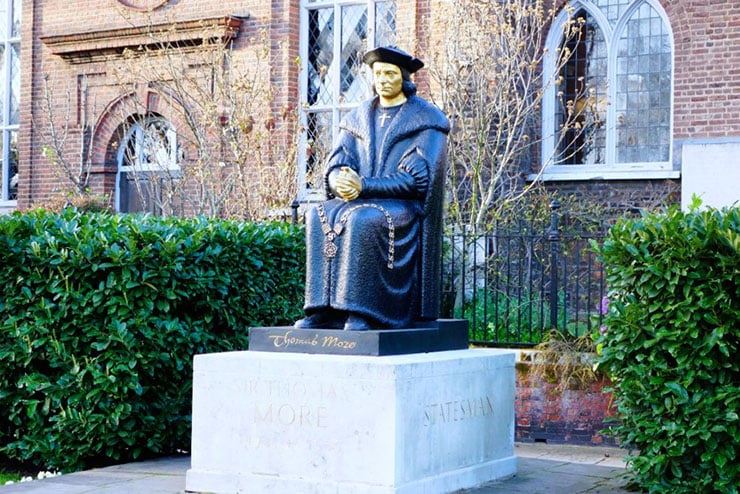The Mystery of Thomas More
by Paul F. Petrick (CBA Member)
Last summer, I was among the cadre of American attorneys who accompanied the Most Reverend Edward J. Burns, Roman Catholic bishop of Dallas, on a pilgrimage to England centered on the life of St. Thomas More. More, the onetime chancellor of England and patron saint of lawyers, politicians, and statesmen is remembered nearly 500 years after his death for his defense of ecclesiastical independence from royal intrusion. The events preceding his martyrdom at the behest of King Henry VIII are well known thanks to the movie A Man for All Seasons (1966). While tracing More’s personal and professional trajectory through London, Oxford, Windsor, and Canterbury, including experiencing the inside of his cell in the Tower of London, I learned a great deal about the Law Society of Great Britain’s “Lawyer of the Millennium.” But what I did not learn troubled me.
Walking in More’s footsteps prompted thoughts of what I would have done had I been in More’s shoes. That’s easy. I would have resigned as chancellor and fled the country. Why More did the former but not the latter puzzled me. Fleeing would have cost More significant money and property, but nothing he was not going to lose anyway. Moreover, More was among Europe’s top legal minds. Lucrative work at the court of some Continental Catholic monarch or even the pope awaited him. The potentate with the greatest potential in this regard was Holy Roman Emperor Charles V who also ruled Spain as Charles I. Spain was then the world’s most powerful country. Serving the House of Habsburg would have been a plum position for More, enabling him to rebuild the lifestyle he enjoyed in England.
If concerns about exposing relatives left behind to retribution kept More from crossing the Channel, his fears were likely misplaced. The rest of More’s family evaded the Henrician persecution by taking the public oaths More refused. Perhaps Henry would have welcomed More’s departure as it would have relieved him of having to kill a man he regarded with fondness.
Undoubtedly, More considered leaving. Years earlier, More drew the ire of Henry’s father, Henry VII, by leading the parliamentary opposition to a proposed tax increase. Henry VII retaliated by imprisoning More’s father and the danger to More himself was such that he was preparing to flee his country when Henry VII’s death obviated the need for his departure.
Insight can be gleaned from The Sadness of Christ (1535), which More wrote while incarcerated. When forced to “suffer torment or deny God,” he reasoned, one may withdraw if it can be accomplished without “disgracing the cause.” More cited the many occasions where St. Paul eluded harm. Honorable is the one who “prudently avoids danger (provided he does not compromise himself).”
More’s cause was the “Tudor Project,” ending the cycle of war and dysfunction that plagued England during the preceding 400 years of Plantagenet rule, culminating in the Wars of the Roses. Life under the Plantagenets was characterized by bitter feuds among the nobility. To unite the nobles, kings embarked on prolonged invasions of France or futile crusades in the Holy Land, all to the detriment of the English people.
Influenced by his mentor Chancellor John Cardinal Morton, More hoped the Tudors would end the internecine violence and foreign adventurism, prioritizing instead the interests of the people. More’s distaste for the pre-Tudor era is visible in his treatment of the last Plantagenet king, The History of King Richard III (1513). The play on the same subject by William Shakespeare, another Tudor apologist, is derivative of More’s work. The warlike Anchorians, in More’s polemic Utopia (1516) also illustrate the Plantagenet folly.
But More became disillusioned when Henry VIII invaded France under the guidance of Chancellor Thomas Cardinal Wolsey, More’s predecessor. More helped broker the peace treaty that ended the conflict and his hope that it would be a lasting peace was the only sentence of his epitaph emphasized by indentation. However, More’s cynicism is revealed in his words to his son-in-law William Roper, “For if my head could win him [Henry VIII] a castle in France it should not fail to go.”
Why didn’t More go work for Charles V or someone else?
Because they were not any better. Charles also had designs on France. And France’s king had designs on Italy. Even the pope, who then possessed great temporal power, “is a prince … in league with all other Christian princes.” The society that best exemplified the humane Tudor Project was “No Place” (Utopia). At least no place on Earth.
More willingly left Earth to join the One King Who would not disappoint him.
